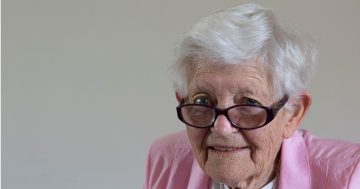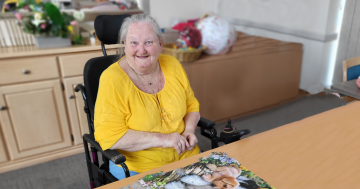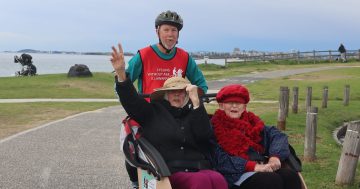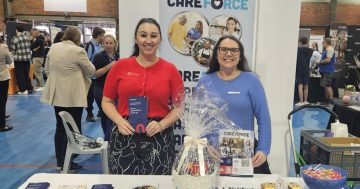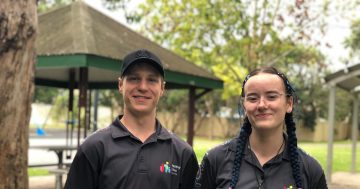
STARS volunteer Catherine Baldachinoff-Miller (left) with STARS volunteer program policy and project officer Tanya Southworth. Photo: Supplied.
Catherine Baldachinoff-Miller is among the Illawarra volunteers supporting a new pilot program at Bulli Hospital, which aims to help older patients stuck in hospital beds transition smoothly into suitable home or aged care arrangements.
Catherine found she had time on her hands, so decided to use her seven years’ experience working for aged care provider Warrigal to become a Supported Transition Assistance Response Scheme (STARS) volunteer for Community Industry Group.
The flagship program was funded by the NSW Ministry of Health to address what has become a chronic and critical issue for older people stuck in hospital beyond their dispatch date.
Often, it’s because the aged care industry is too confusing and complex for the patient or their loved ones to navigate themselves.
Catherine said through various roles in aged care she had been focused on the customer experience, allowing her to understand options within retirement villages, aged care homes and home services.
“It allowed me to get an understanding about how complicated and difficult it is for older people and their families and how emotional it can be,” she said.
“On a personal level, my mother had Alzheimer’s … and so I know the importance of having the right services. So I’ve got that lived experience.”
She said when she saw it posted on LinkedIn that volunteers were being sought for the pilot program, she felt she would be a good fit.
“I thought, well, I can do that. I actually have knowledge, and I can help, because I’m so people focused and I can empathise, because I lived it,” she said.
One of her tasks was to help a man with dementia, who has English as his second language, transition out of Bulli Hospital after being there for several months.
Being French herself, she said knowing other languages had helped her carry conversations with him.
“I was also able to talk with one daughter in particular and I was able to help her with understanding aged care, what she should be looking at and answer her questions and worries,” she said.
“Nobody wants loved ones to go into aged care homes, but you can share how it’s different from the hospital and how good and safe it is.”
She said the man had now moved into aged care, and she was catching up with his daughter soon to see how he had settled in.
“I felt like I helped because I understand aged care and I understand how difficult it is for everyone involved, and how emotional it is,” she said.
The STARS program has been running for a few months and is now preparing to work with more hospitals and recruit more volunteers.
“If you have any lived experience, if you have any professional knowledge, and you have some time – you can give as much time as you want like any volunteer job – it really can make a difference in the life of the older people and their families,” she said.
“Ultimately, a hospital is not a home. An aged care home is a home.
“They shouldn’t be called nursing homes, because that’s not what they are and is an old idea with a stigma attached to it.”
She said it felt good to help people leave hospital and transition back into their own home safely or an aged care facility where they were able to be looked after correctly.
“I hope this pilot program expands and more hospitals join it,” she said.
“We’re not there representing anyone, we’re just there to help. It’s about the older person, not the provider, not the government, not even the hospital.”
Catherine said with an aging population, it was important hospitals were kept for medical issues and not for older people unable to access alternatives.
She said through the pilot program, volunteers were able to share with Community Industry Group ways to further improve communication between hospitals, ACAT (aged care assessment team), aged care homes and volunteers.












